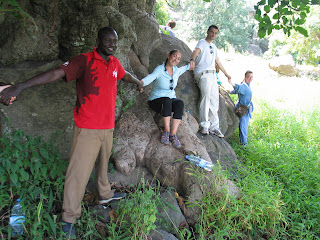My village family in Nathia.
Our faithful bus left the campment (a rural African hotel composed of huts) last Monday afternoon to drop all of us off at our respective villages. We would spend the next 4 days living with a family of an ethnic minority group in a small village surrounding Kedougou. While all of my peers would be living in a village with one or two others, I had learned a few hours earlier that I would be ALONE in a NEW village! (they have never hosted a student before). My village is called Nathia, and the people are of the ethnic minority Peul Bandee. Their language is Pulaar. Part of me was honored to learn this news, but part of me was nervous. The butterflies in my stomach intensified on the bus ride because my village was the farthest away and I was dropped off first! The road to my village was too rugged for the bus, so I had to get out and walk with one of the locals the rest of the way. I said my goodbyes and began to follow this guy into the bush. I looked over my shoulder a few times, happy to see my friends still waving to me from the bus. Then it came to the point when I looked back, and the bus was out of view. Holy shit, I’m in the middle of Africa, walking down a trail with grass up to my chest on either side. I have no idea where I’m going. What’s going to happen??!? I’m not going to see anyone I know for 4 days ahhhhhh. Basically a million questions raced through my mind. A few anxious minutes later, I saw a cluster huts peeking over the grass. Then a pack of children came running toward me, smiles smeared across their faces. They grabbed my hands and dragged me into the compound. I immediately felt welcome and my worries vanished.
My host family, the Ba family, is headed by Boubacar Ba: the director of the local school. He lives with his two wives, Maimouna (whom he has 9 children with), and Fanta (whom he has 7 children with). My family lives in a compound of 9 huts removed from the rest of the village. Only 200 people live in Nathia, and my family accounts for 20 of them! Living in a polygamous setting for a few days was a completely new experience, to say the least. Bouba and I had a few discussions about marriage, and while our opinions differ greatly, I have to say having many many hands sure does make light work, and there is LOT of work that has to get done every day in a village. Gathering food for 3 meals a day, retrieving water from the well, cooking, doing laundry in the river, cleaning up, taking care of the young-ins, and the women do it ALL!
I felt very connected to the earth while in the village, because all of the food we ate was harvested right before the meal: the rice, the corn, the gumbo (a vegetable), the spices (like little spicy peppers), the peanuts (I ate more peanuts than I ever thought I could). It was also enjoyable to be away from money for the week. I can now say that I have hearded cows! My family has 27. They go out and graze in the bush all day, and before sundown, we went out acted as any good sheep dog. Condensing them into a group, then guiding them back to the village. At that point, we would drag them by the horns to their posts where we would tie them down by the horns. It was hard, it was impossible not to step in pile of poop after pile of poop, but it was so fun.
Some of the other things I did last week:
Busted a tire en route
climbed a gorgeous mountain!
the view of the mountain range between Senegal and Guinea is phenomenal AND we were up there at sunset!
visited the Dindefelo waterfall. It was breathtaking. I'd say it was over 300 ft tall.
We swam in it too!
This is my host father, Boubacar Ba, with the briefcase. I took this on the walk to his school one day. The other man, with the bike, is the chief of the village. He has been chief for over 30 years.
Here are all (well, some) of my sisters in the peanut fields. Peanuts are a huge source of income in villages. I ate some right from the ground.
My family compound. It's like a living organism.
My host brother Abdul pouring Ataaya tea. It a ritual, the pouring of this tea. The Senegalese drink it every day after lunch, and it is always served in the same 2 little cups.
This is some of us surrounding the biggest baobab tree in Senegal! It is over 300 years old, and it took 23 of us, hand to hand, to reach all the way around it. Pretty cool.












No comments:
Post a Comment